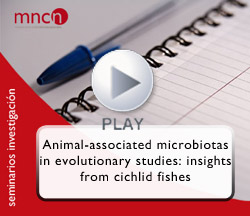Animal-associated microbiotas in evolutionary studies: insights from cichlid fishes. Laura Baldo del GRIB (Research Programme on Biomedical Informatics) de Barcelona
Título: Animal-associated microbiotas in evolutionary studies: insights from cichlid fishes
Ponente: Laura Baldo del GRIB (Research Programme on Biomedical Informatics) de Barcelona
Resumen:
One of the most fascinating and still poorly understood symbioses has evolved between both vertebrate and invertebrate hosts, and complex microbial communities that colonize the digestive tract, known as gut microbiota. With the advent of HT sequencing technologies we have just began unveiling the genetic and functional diversity as well as the evolutionary role of these microbial consortia in animal evolution. How does the gut microbiota evolve along the host lineages? What are the factors that shape it? Can the microbiota be considered as an inherited trait? And if so, is the microbiota a simple mirror or also a driver of the host evolution?
Both diet and host phylogeny are shown as crucial predictors of microbiota features, while the relative contribution of these two factors in recapitulating microbial communities relationships is currently under debate. Therefore closely related species that show a large differentiation of feeding habits represent an especially interesting system to investigate microbiota dynamics in response to concurrent host legacy constraints and selective pressures for rapid adaptation to different diet.
We are currently exploring specificity and dynamics of the gut microbiota in East African Cichlid fishes, which represent a large group of closely related species that underwent a spectacular dietary niche radiation. Using HT technologies, we profiled the gut microbiota of a young cichlid tribe from lake Tanganyika that recently transitioned from a generalist feeding to a highly specialized diet primarily based on scales. How did the gut microbiota respond to such diet transition?
Seminario disponible en Cienciatk






